With so many different types of probiotics on the market, it can be hard to know which one is right for you. In this comprehensive guide, I break down exactly what you should consider, what you should avoid and why you should start taking probiotics. I’ve also included my science-backed recommendation for my favorite probiotic.
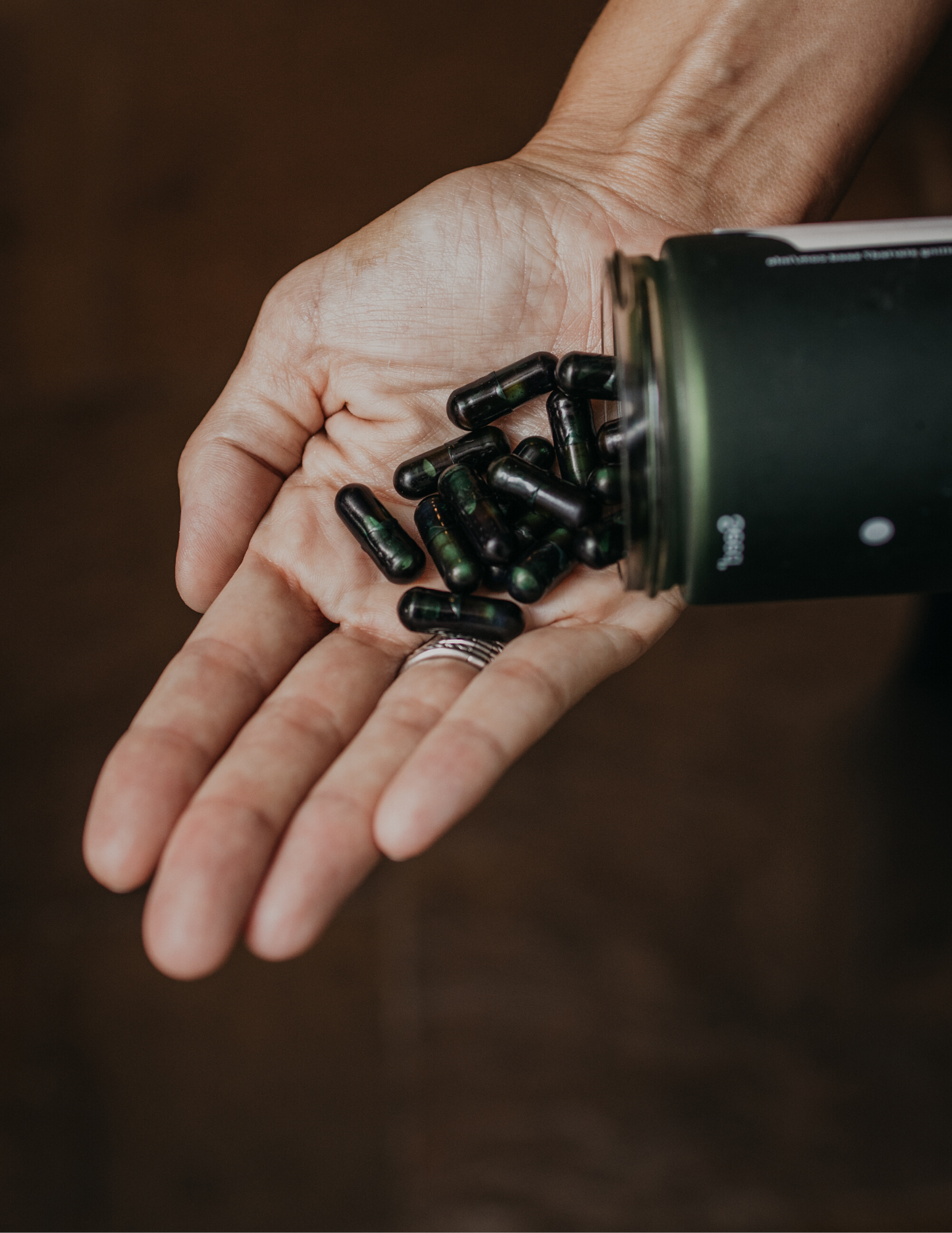
By: Lisa Fennessy. Medical contribution from Kristin Oja, DNP, FNP-C, IFCMP, and founder of STAT Wellness.
Okay. We all know we need to take a probiotic. But the question is, WHICH ONE?! I don’t know about you but shopping for probiotics makes my head spin. Just when you think you’ve got it right, you find out you’re wrong and it’s back to the proverbial probiotic drawing board.
IN THIS POST:
- Why is picking a probiotic so confusing?
- Things to be aware of when choosing a probiotic
- How to choose a probiotic that’s right for you
- The probiotic I use and recommend
Why is picking a probiotic so confusing?
Now, it’s not my style to buy a one-way ticket to Negative Town, but when it comes to supplements it’s all about being discerning, making good decisions and avoiding being taken advantage of.
And why would we be taken advantage of? Well to start off, the dietary supplements market is projected to hit a valuation of U.S. $349.4 billion by 2026 (1) and the 2012 National Health Interview Survey (NHIS) showed that about 4 million (1.6 percent) U.S. adults had used probiotics or prebiotics in the past 30 days (2).
Long story short, with all that money on the table there is bound to be…corruption, lies and sneaky marketing tactics.
Now, this doesn’t overshadow the fact that probiotics can help with overall wellness. Kristin Oja, DNP, FNP-C, IFCMP, and founder of STAT Wellness explains, “pro” and “biotics” literally means “for life.” She says, “They are the beneficial bacteria (or yeast) that promote a healthy digestive tract, help with serotonin levels (happy neurotransmitters), metabolism, contribute to a healthy immune system, and better-looking skin.”
They have even shown promise for a variety of conditions, including the prevention of antibiotic-associated diarrhea, prevention of necrotizing enterocolitis and sepsis in premature infants, treatment of infant colic, treatment of periodontal disease, and induction or maintenance of remission in ulcerative colitis (3).
The key to finding a great probiotic, however, requires making informed decisions, label reading, brand transparency and science. But I’m getting ahead of myself.
RELATED: Get more healthy living tips.
Things to be aware of when choosing a probiotic
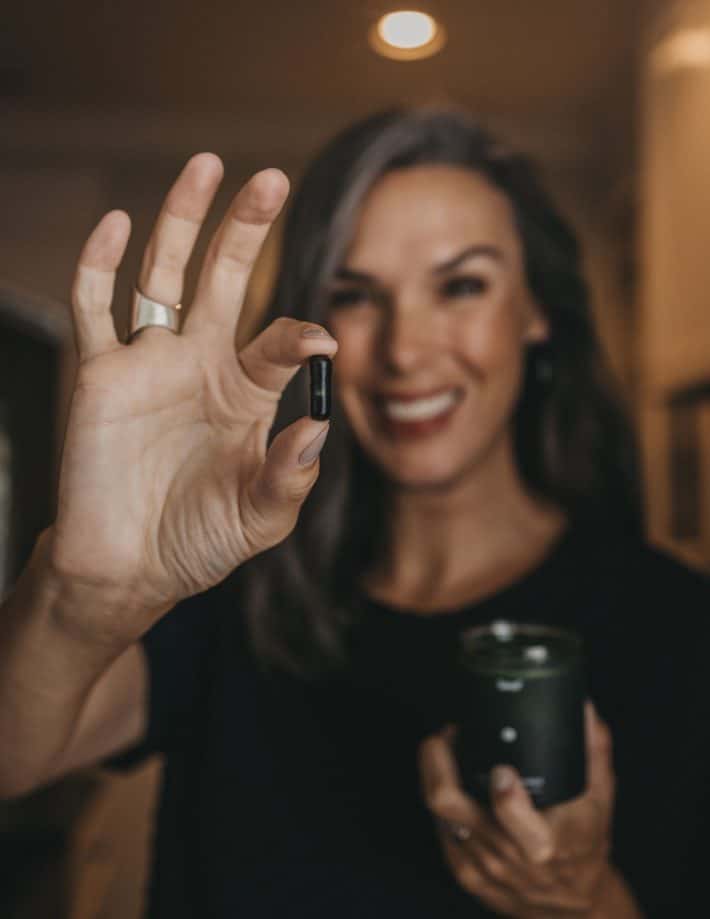
Let’s start by identifying a few pitfalls in the probiotic/supplement industry.
1. Supplements are a self-monitored industry
Supplements are not required to be approved by the FDA before being sold or marketed. Supplement companies are responsible for having evidence that their products are safe, and the label claims are truthful and not misleading (4). This is an “innocent until proven guilty” model that works in favor of the supplement companies, not consumers.
2. Probiotics in food are not always reliable
Probiotics can be added to foods like yogurt, but benefits rely on the types and amounts added and are not guaranteed. In addition, some fermented foods (such as sourdough bread and most pickles) are processed after fermentation, which kills the microorganisms (5) and the benefit.
3. Probiotics do not always make it to the colon
Probiotic strains need to reach the colon to be effective. Many probiotic strains from food and supplements can be killed off during intestinal transit (6).
4. Labeling pitfalls
Current labeling regulations only require manufacturers to list the total weight of the microorganisms on labels. This total weight can consist of both live and dead microorganisms and has no relationship with the number of viable microorganisms in the product (6).
5. Properly labeled CFUs (colony forming units)
Avoid products that list the number of CFUs “at time of manufacture” because this information does not account for the decline in CFUs over a product’s lifespan (6).
6. Cited NON-facts
Be aware that sometimes companies supply so-called “proof” of their claims by citing undocumented reports from satisfied consumers or graphs and charts that could be mistaken for well-conducted scientific research (7).
7. Seals of approval
There are a few independent organizations that offer “seals of approval” that may be displayed on dietary supplement products. These “seals of approval” do not mean that the product is safe or effective. Instead, they provide assurance that the product contains the ingredients listed on the label and that it does not contain harmful levels of contaminants (7).
8. Loosey-goosey terms
Some manufacturers use the term “standardized” to describe efforts to make their products consistent. However, U.S. law does not define standardization when it comes to supplements. Therefore, the use of this term (or similar terms such as “verified” or “certified”) does not guarantee product quality or consistency (7).
9. Phthalates and allergen coatings
Be sure to check out the “inactive ingredients” list as well to see how the probiotic has been encapsulated. Here are just a few examples of materials used (8).
How to choose a probiotic that’s right for you
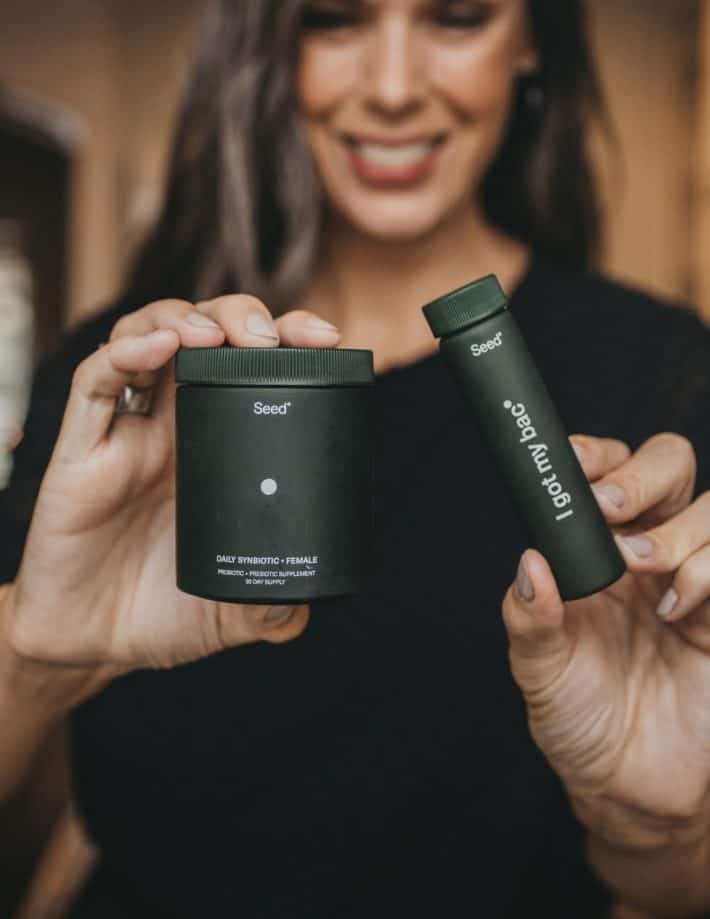
Okay so we’ve established that the opportunity to take advantage of the consumer is RIPE when it comes to supplements and probiotics specifically. But don’t give up and throw in the probiotic towel yet. Let’s dig into some tips on how to choose a probiotic that’s legit and then I’ll give my personal recommendation below.
According to Kristin Oja, DNP, FNP-C, IFCMP, there are four things you should consider:
1. Consider the brand
There are no FDA regulations over the supplement industry, making it hard to know what quality you are getting. We recommend picking out a supplement that has been through third-party testing. This means it has been evaluated by an unbiased group to ensure that what is written on the ingredient list is actually what is in the capsule, tablet, or powder.
A few non-profit organizations that do this testing include: consumerlabs.com, NSF international, UL and U.S. Pharmacopeia.
It is important to note that these organizations only verify ingredient lists and not claims made by the company (i.e. “all natural,” “heal your gut today,” “restore digestive health”), so you cannot believe everything written on the bottle, even if it is third party certified. It also does not mean the supplement is safe or effective for you.
My recommendation is to work with a healthcare provider to determine what is most beneficial for you.
2. Look at the CFUs
“CFU” stands for “colony-forming unit.” This is the number of live organisms in the supplement. While a higher CFU can be a good indicator, it does not necessarily mean it is a better product. It is about finding the right balance for you, but in general, we recommend between 10-50 billion CFUs.
Unfortunately, many probiotics on the market are destroyed by your stomach acid before they reach your small and large intestines. Therefore if the probiotic you are taking is not properly made and researched, it does not matter how many CFUs you start with.
Many of the research-based probiotics are in enteric capsules that do not get destroyed by your stomach acid. It is important to take the extra step and make sure the probiotic company you are using has done the research to prove the CFUs are well absorbed up until their expiration date.
**Unfortunately there is nothing you can read on a label to ensure the CFUs are accurate and well absorbed.
3. Go with diversity
The more diverse the probiotic, the better. When referring to diversity, I mean the different strains within the probiotic.
The two most common genera (plural for genus) are lactobacillus or bifidobacterium. The species and strain vary from probiotic to probiotic; for example, a probiotic may say lactobacillus (genus) acidophilus (species) LA1 (strain).
The even more confusing part is some of these strains are better for constipation, diarrhea, bacterial vaginosis, urinary tract, etc. When picking an over the counter probiotic, I recommend finding one with at least 5 different strains to give you more diversity. Rotating brands is also helpful, since a diverse gut microbiome is a healthy gut microbiome.
4. Shelf stable
Not all refrigerated probiotics are better. There are more and more probiotics that have been freeze dried to maintain efficacy. It is important to check the expiration date, however, because dead probiotics are never beneficial. It is also important to make sure to keep probiotics out of sunlight or direct heat, which can cause them to become less effective over time.
I recommend SEED’s Daily Synbiotic
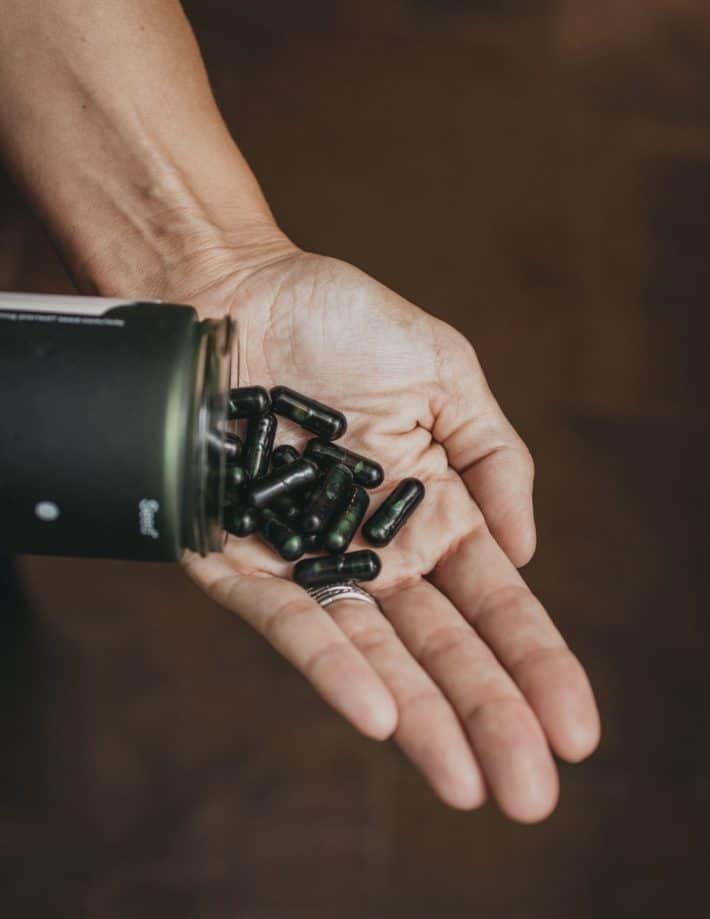
Now that we know what to look for in a probiotic and what to avoid, let’s talk about a good option that not only meets but exceeds all of the above criteria.
Meet SEED.
SEED is a probiotic company informed by a Scientific Advisory Board comprised of scientists, researchers, doctors and authors across the fields of microbiology, immunology, genetics, metabolomics, gastroenterology, pediatrics, molecular biology and transcriptomics—including primary investigators from the NIH’s Human Microbiome Project. You can check out everyone involved here.
Seed developed what they call their Daily Synbiotic, a combination of 24 probiotic strains with a non-fermenting prebiotic compound sourced from Indian pomegranate.
Hold up…What? Did you just say prebiotic? Non-fermenting? Compound? I’m already lost.
Okay so here it is, big picture. Probiotics are live microorganisms that when administered in adequate amounts, confer a health benefit on the host (that’s you!) (UN/WHO Expert Panel, 2002). This is the kind of bacteria that improves gut health within your body, which in turn may lead to improved overall wellness.
A prebiotic, on the other hand, is often referred to as the food that feeds the bacteria. But we know that this is only part of the story. Certain non-fermenting prebiotics (such as the punicalagin included in the Daily Synbiotic) are biotransformed by gut microbes into important compounds that support key aspects of your health.
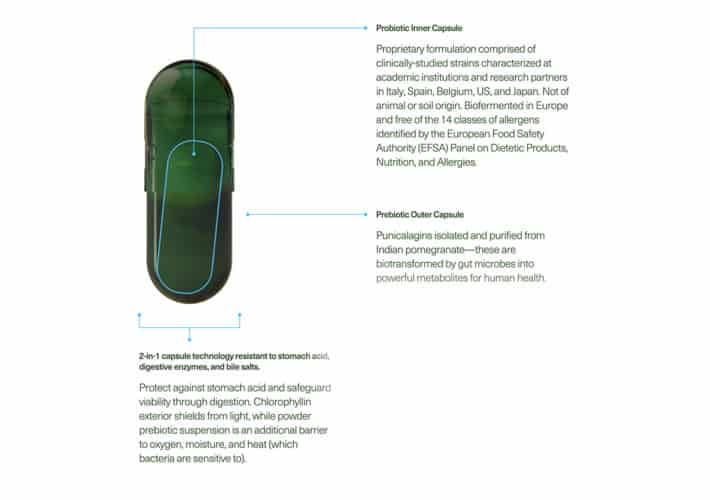
Specifically, Seed uses a 2-in-1 capsule. The probiotics reside inside an inner, smaller capsule, which is nested within the outer capsule (that contains the prebiotic powder). This outer capsule serves as a barrier for oxygen and moisture as well as a buffer against heat stress, and ensures that the probiotic strains make it to the colon, alive, where their work begins.
According to Seed, they are the “first to take this Microbe-Systems approach with strain-specific benefits beyond digestive health. [SEED also formulates to include] skin health, heart health and micronutrient synthesis.”
Use TNK15 to save 5% off the first month of your SEED subscription!
What sets SEED apart from the rest
There is definitely no “standardization” talk when it comes to SEED. SEED’s Daily Synbiotic “includes clinically studied probiotic strains that deliver core benefits to the gastrointestinal system which, in turn, influence systemic health.”
I personally love that with 24 strains, I am getting a wide, diverse range of probiotic activity. But not only that, SEED includes probiotic strains to target the following areas:
- Digestive Health/GI Immunity/Gut Barrier Integrity
- Dermatological Health
- Cardiovascular Health
- Micronutrient Synthesis
Did you notice “Dermatological Health”? Yeah, that’s skin health, ladies! Several of the strains in the Daily Synbiotic have been studied for their beneficial effects on atopic dermatitis (eczema) and have demonstrated improvement in SCORAD scores and the promotion of overall skin health.
SEED adds, “To date, our strains have collectively been studied in 16 strain-specific, double-blind, placebo-controlled, published human studies conducted in the United States, United Kingdom, Italy, Spain and Japan, as well as 13 in vitro/ex vivo mechanistic studies.” You can check out those studies here.
AKA, there is no sneaky “all-natural,” “heal your gut today” or “restore digestive health” marketing talk around here. Just the facts to back it up.
For more, you can check out all the included strains and what they specifically target on SEED’s Label Reading 101 resource page.
On the label…
Speaking of labels: On SEED’s label you will also notice that instead of CFUs, SEED measures in AFU (Active Fluorescent Units). This allows SEED to calculate a more precise measurement of all viable cells, including ones that are efficacious but not necessarily culturable (and therefore would not be counted in a traditional plated CFU measurement). You can see on the label that SEED’s Symbiotic comes in at over 50 billion AFU.
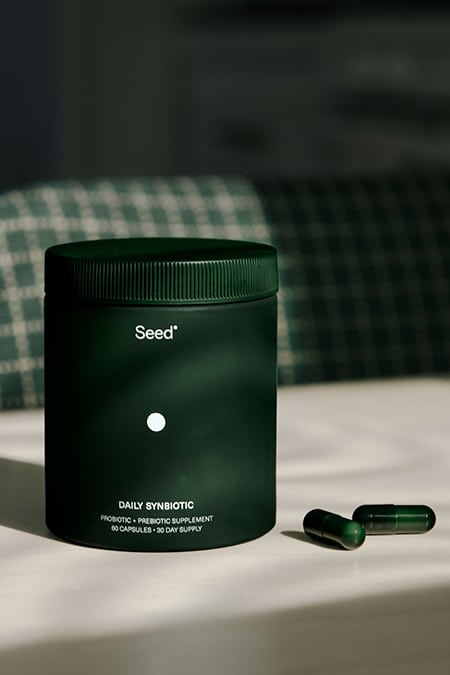
ALSO! SEED’s Daily Synbiotic is free from dairy, gluten, soy, GMOs, binders, fillers, preservatives, crustacea, mollusk, egg, fish, peanut, tree nuts, milk, lupin and corn. It’s also vegan.
This is huge for anyone with allergies….like me!
Some more things that impressed me about SEED.…
- Their capsules are tasteless and easy to swallow.
- Their glass packaging is housed in a compostable bio-based tray made of renewable ingredients, and is planet-friendly.
- They offer refills in compostable packaging.
- Every piece of printed material, including their shipper box, is Forest Steward Councilship (FSC) certified and sourced from responsibly managed forests.
Grab your SEED Daily Synbiotic here! Use TNK15 to save 5% off the first month of your subscription.
Have you tried SEED?

P. S. Check out my review on this portable smoothie blender and this DIY face mask that treats acne, eczema, dry skin and more!
My experience with my Daily Synbiotic is authentic only to me and that all opinions are mine alone. And while we’re on the subject, there are definite strain-specific and evidence-based benefits of the Daily Synbiotic, however, it is certainly not intended to diagnose, treat, cure or prevent any disease.
TNK Team Note: This article contains affiliate links. TNK uses affiliate links as a source for revenue to fund operations of the business and to be less dependent on branded content. TNK stands behind all product recommendations. Still have questions about these links or our process? Feel free to email us.
FREQUENTLY ASKED QUESTIONS
Probiotics promote a healthy gut and improve digestion by preventing things like constipation, diarrhea, bacterial vaginosis, urinary tract.
SEED’s Daily Synbiotic “includes clinically studied probiotic strains that deliver core benefits to the gastrointestinal system which, in turn, influence systemic health.” It is also free from dairy, gluten, soy, GMOs, binders, fillers, preservatives, crustacea, mollusk, egg, fish, peanut, tree nuts, milk, lupin and corn. It’s also vegan.
REFERENCES
1. Market Study Report, LLC; Dietary supplements market size to reach a value of US$ 349 billion by 2026; Intrado Globe Newswire, March 24th 2020; https://www.globenewswire.com/news-release/2020/03/24/2005306/0/en/Dietary-supplements-market-size-to-reach-a-value-of-US-349-billion-by-2026.html
2. National Center for Complementary and Integrative Health; Statistics From the National Health Interview Survey; https://www.nccih.nih.gov/health/statistics-from-the-national-health-interview-survey
3. National Center for Complementary and Integrative Health; Probiotics: What You Need To Know; https://www.nccih.nih.gov/health/probiotics-what-you-need-to-know
4. National Institutes of Health Office of Dietary Supplements; What You Need to Know, Dietary Supplements; https://ods.od.nih.gov/factsheets/WYNTK-Consumer/#
5. National Institutes of Health Office of Dietary Supplements; Probiotics Fact Sheet for Consumers; https://ods.od.nih.gov/factsheets/Probiotics-Consumer/
6. National Institutes of Health Office of Dietary Supplements; Probiotics Fact Sheet for Health Professionals; https://ods.od.nih.gov/factsheets/Probiotics-HealthProfessional/
7. National Institutes of Health Office of Dietary Supplements; Health Information; Frequently Asked Questions (FAQ): Use and Safety of Dietary Supplements; https://ods.od.nih.gov/HealthInformation/ODS_Frequently_Asked_Questions.aspx#Brands
8. Antonia Terpou; Aikaterini Papadaki; Iliada K. Lappa; Vasiliki Kachrimanidou; Loulouda A. Bosnea; Nikolaos Kopsahelis; US National Library of Medicine; Probiotics in Food Systems: Significance and Emerging Strategies Towards Improved Viability and Delivery of Enhanced Beneficial Value; Nutrients, July 2019; https://www.ncbi.nlm.nih.gov/pmc/articles/PMC6683253/




Martyna
April 1, 2021I would love to take a probiotic (just to boost my overall health) and the few times that I have tried it, it has made me extremely bloated. I do not have any digestive issues or any underlying health issues. And I get disappointed that I have to throw out or return the product. Any advice? Thank you Lisa !
Lisa
April 5, 2021Hi Martyna! That sounds so frustrating. I would recommend consulting your doctor for help ; ), xo, Lisa